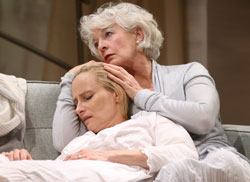Review: The Lady From Dubuque

Not that I’m in any rush, but whenever death comes for me I hope it takes the form of the Lady from Dubuque.
As elegantly personified by Jane Alexander in the Signature Theatre’s revival of Edward Albee’s haunting play being presented under the possessory moniker of Edward Albee’s The Lady From Dubuque, death is a highly comforting presence.
The Signature is well fulfilling its mandate by resurrecting this rarely seen work, which lasted a mere twelve performances upon its 1980 Broadway premiere. But while it received a critical drubbing at a time when the playwright was in a definite career slump, this revival strongly makes the case that--while not one of Albee’s major works—it definitely deserves reconsideration.
It begins in a fashion recalling his classic Who’s Afraid of Virginia Woolf, with three couples engaged in a party game in a well-appointed suburban home which, like the domestic battleground in God of Carnage, is decorated with African tribal art.
The game is 20 Questions, which is never conducive to peace and harmony but does lead one of the characters to ask the existential question, “Who am I?” The participants include hosts Sam (Michael Hayden) and his wife Jo (Laila Robins); next-door neighbors Edgar (Thomas Jay Ryan) and Lucinda (Catherine Curtin); and Sam’s best friend, Fred (C.J. Wilson) and his latest, younger girlfriend Carol (Tricia Paoluccio).
It soon becomes apparent that Jo is ill--terminally ill in fact--and is subject to bouts of horrific pain. The gathering thus ends early, but not before the arrival, just before the first act curtain, of a beautifully dressed older woman (Alexander) and her dapper African-American companion (Peter Francis James).
When a bleary-eyed Sam stumbles upon them the following morning, he’s more than a little discomfited, especially since the “Lady from Dubuque” claims to be Jo’s mother. Meanwhile, her cohort, Oscar, proves to be a rather menacing figure, mocking the confused Sam and adopting an exaggerated shuffle and dialect when his race is pointed out.
The rather contrived return of the previous evening’s guests creates further conflict, with Sam eventually being rendered unconscious by Oscar via a Vulcan-like nerve pinching. But when a clearly agonized Jo eventually makes her way downstairs, she immediately takes comfort in the presence of her female visitor, who embraces her like the mother she pretends to be.
Although the play is not exactly subtle in its allegorical conceit of death, it nonetheless exerts an undeniable fascination thanks to Albee’s gift for blending nasty humor, poignant drama and cosmic ideas in compelling fashion.
This revival staged by David Esbjornson expertly mines the work’s elemental power, and is beautifully acted by the ensemble. Although anyone who saw the original production could never forget the thrilling performances by Irene Worth and Earle Hyman as the mysterious visitors, Alexander and Frances James are superb successors, with the latter entertainingly mining his character’s droll humor.
After this successful resuscitation, more exploration of the Albee canon is clearly warranted. One can hardly wait to see what this adventurous company might do with the notorious 1983 flop, The Man Who Had Three Arms.
Pershing Square Signature Center, 480 W. 42nd St. 212-244-7529. www.signaturetheatre.org. Through April 15.
| Print article | This entry was posted by Frank on 03/07/12 at 04:53:02 am . Follow any responses to this post through RSS 2.0. |